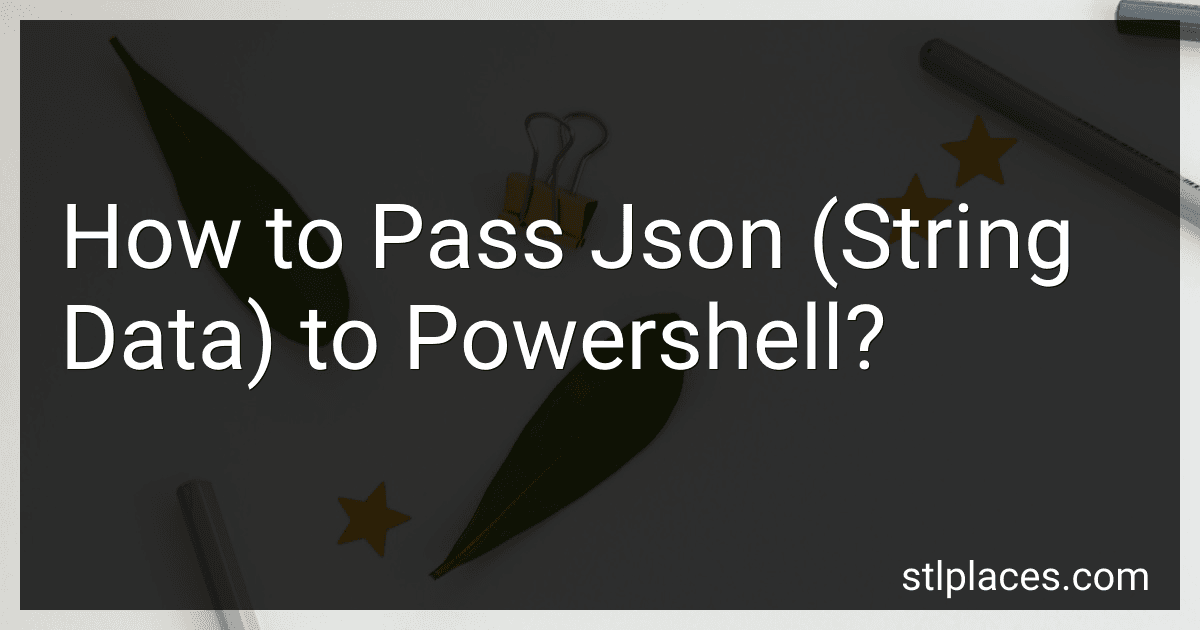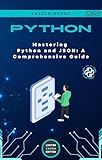Best JSON Parsing Tools for PowerShell to Buy in February 2026
To pass JSON (string data) to PowerShell, you can use the ConvertFrom-Json cmdlet to convert the incoming JSON string into a PowerShell object that you can work with. Here's an example of how you can pass JSON data to PowerShell:
- Store your JSON data in a variable as a string:
$jsonString = '{"key1": "value1", "key2": "value2"}'
- Use the ConvertFrom-Json cmdlet to convert the JSON string into a PowerShell object:
$object = $jsonString | ConvertFrom-Json
- You can now access the values in the JSON object using the keys:
$value1 = $object.key1 $value2 = $object.key2
By following these steps, you can easily pass JSON (string data) to PowerShell and work with it in your scripts.
How to handle errors while parsing JSON (string data) in PowerShell?
When parsing JSON (string data) in PowerShell, it is important to handle any errors that may occur. Here are some ways to handle errors while parsing JSON in PowerShell:
- Use Try-Catch blocks: Wrap the code that parses the JSON data in a Try-Catch block to catch any errors that may occur during the parsing process. This allows you to handle the error gracefully and display an appropriate message to the user.
Example:
try { $jsonData = '{"name": "John", "age": 30}' $parsedData = $jsonData | ConvertFrom-Json } catch { Write-Host "An error occurred while parsing the JSON data: $_" }
- Use the -ErrorAction parameter: When using the ConvertFrom-Json cmdlet to parse JSON data, you can use the -ErrorAction parameter to specify how errors should be handled. You can set it to 'Stop' to automatically throw an error when an issue occurs, or 'SilentlyContinue' to suppress errors.
Example:
$jsonData = '{"name": "John", "age": 30}' $parsedData = $jsonData | ConvertFrom-Json -ErrorAction Stop
- Validate the JSON data: Before trying to parse the JSON data, you can use the Test-Json cmdlet to check if the data is valid JSON. This can help prevent errors before they occur.
Example:
$jsonData = '{"name": "John", "age": 30}' if ($jsonData | Test-Json) { $parsedData = $jsonData | ConvertFrom-Json } else { Write-Host "The JSON data is invalid." }
By using these techniques, you can effectively handle errors while parsing JSON data in PowerShell and ensure a smooth and reliable experience for your scripts.
How to validate JSON (string data) in PowerShell?
To validate JSON string data in PowerShell, you can use the ConvertFrom-Json cmdlet which converts a JSON-formatted string into a PowerShell object. If the JSON string is valid, the cmdlet will successfully convert it into an object. If the JSON string is invalid, the cmdlet will throw an error.
Here is an example of how to validate JSON string data in PowerShell:
$jsonString = '{"name": "John", "age": 30}' try { $jsonObject = $jsonString | ConvertFrom-Json Write-Host "JSON string is valid" # You can now work with the $jsonObject PowerShell object } catch { Write-Host "JSON string is not valid: $_" }
In this example, the $jsonString variable contains a JSON-formatted string. The ConvertFrom-Json cmdlet is used to convert the JSON string into a PowerShell object, and if the conversion is successful, it means the JSON string is valid. If an error occurs during the conversion, it means the JSON string is not valid.
You can adjust the script as needed to handle the JSON data validation in your specific use case.
How to pass JSON (string data) to PowerShell using a script?
You can pass JSON string data to PowerShell using a script by utilizing the Invoke-Command cmdlet and specifying the JSON string data as a parameter. Here's an example script to demonstrate this:
# Define the JSON string data $jsonData = '{"key": "value"}'
Define the PowerShell script with a parameter for the JSON data
$script = { param($jsonData)
# Convert the JSON string data to a PowerShell object
$jsonObject = ConvertFrom-Json $jsonData
# Output the JSON object
$jsonObject
}
Invoke the PowerShell script with the JSON string data as a parameter
$result = Invoke-Command -ScriptBlock $script -ArgumentList $jsonData
Output the result
$result
In the above script, the JSON string data is defined as $jsonData and a PowerShell script is defined that takes the JSON data as a parameter. The script converts the JSON string data to a PowerShell object using the ConvertFrom-Json cmdlet and outputs the JSON object.
The Invoke-Command cmdlet is then used to execute the PowerShell script with the JSON string data passed as an argument. Finally, the result of the script is outputted. This is how you can pass JSON string data to PowerShell using a script.



